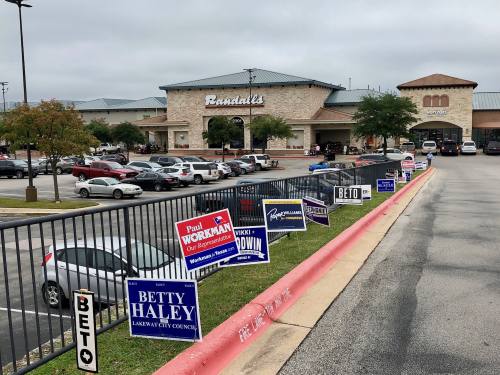Three cities west of Austin have been leading a charge to remain compliant with federal mandate, but according to officials, a current Texas law is hindering that effort.
At a recent Lakeway City Council meeting, resident Tom Kilgore spoke before the body during public comment and commended officials for addressing the need to change the city’s sign ordinance to comply with federal case law.
“In this case I would like to applaud the city attorney for finding the discrepancy,” Kilgore said. “However, I do not believe it is a necessary function to get this resolved prior to moving forward with the sign ordinance.”
Kilgore went on to say at the Oct. 15 meeting that Lakeway officials did not need to request that the Texas Legislature repeal or amend its law referring to the regulation of political signs before first amending its own sign ordinance.
Lakeway City Council has been working on amending its sign ordinance for several months and will continue to do so, officials say. But the item agenda Kilgore said was unnecessary, or at least premature, centers on an issue that more and more cities have been addressing.
In October the City of Lakeway became the third in the Lake Travis-Westlake area to formally request the repeal of a Texas law governing the regulation of signage. Like the city councils in Bee Cave and West Lake Hills, Lakeway City Council joined the effort to correct a clear contradiction between federal and state mandate. So far leaders in all three cities say the effort is preemptive and meant to avoid potential legal issues before they begin.
Specifically, the 2015 Supreme Court decision of Reed v. Town of Gilbert holds that any distinction in treatment of different types of noncommercial signs based on message, including political signs, is unconstitutional for almost any purpose. Signs may be regulated, but regulations are limited to physical characteristics, location and duration of the sign, not the content.
The federal ruling is in direct opposition with Section 216.903 of the Texas Local Government Code, which requires Texas cities to regulate political signs differently than all other signs.
Because of that, the West Lake Hills City Council on Aug. 29 and Bee Cave City Council on Sept. 25 adopted resolutions asking the Texas Municipal League to include in its upcoming legislative agenda language that would clean up the state statute so it does not conflict with federal law.
Citing the moves from those two cities, Lakeway City Attorney Cobby Caputo on Oct. 15 said that it would be useful to have the city be on record as also favoring a repeal, or at least an amendment to the current state law.
“Then we can get back to looking at amending the sign ordinance and go through the process on that,” Caputo said. West Lake Hills takes the Lead
West Lake Hills at its Aug. 29 City Council meeting requested help from the TML to repeal the Texas law. City Administrator Robert Wood said that because it is not possible for a Texas city today to write a sign ordinance that complies with both the state law and the federal case law that has recently come out, it made sense to get out ahead of the issue.
Council had already amended its own sign ordinance to comply with Reed.
“We’ve got this conflict, and we see the best way of eliminating the conflict as repealing the state’s specific statute that deals with political signs since our attorney’s interpretation of the case law is that that’s no longer allowed,” Wood said.
Bee Cave City Council has so far not amended its sign ordinance to comply with Reed, but the city followed suit on Sept. 25 adopting a resolution to request the TML help repeal the state law.
The Lakeway City Council has spent the past several months amending the city’s sign ordinance to comply with Reed and brought the item before City Council at its Sept. 17 meeting.
Council discussed the amended ordinance in executive session but ultimately tabled approval of the agenda item so the city attorney could further review the various sections discussed.
“We’ve made some changes to [Lakeway’s sign ordinance] based on the conversation that was held [Sept. 17], so we’ll publish [a new version of the proposed ordinance] again ahead of time like we did last time,” Caputo said.
Lakeway City Manager Steve Jones said that though officials have been working on amending the city’s sign ordinance for months, further action will likely be put on hold until action either way takes place during the 2019 Texas legislative session.
“It’s very important because there are people out there that will file a lawsuit if they feel like you’re violating one law or another,” Jones said.
Next steps
The TML is a group that, among other initiatives, handles legislative advocacy on behalf of Texas cities. Executive Director Bennett Sandlin said Oct. 16 that the group did not end up including the item as part of its agenda, but added it does not have to be the one to carry it for the cities to continue campaigning for the legislation.
“They can get support from their local senators or other cities, for example; it just won’t appear in our agenda,” he said.
Sandlin told Community Impact Newspaper in September that another option for cities is to challenge the state law in court, but added that was just speculative at this point. Beyond any action TML would have taken regarding accepting and supporting the resolutions, Sandlin said he is not sure if the state Legislature will repeal the law. The state law is clearly unconstitutional at this point, he said, but it is difficult to predict what side lawmakers will fall on.
Wood said that West Lake Hills is still pursuing the matter, this time with Focused Advocacy, a public affairs firm based in Austin that specializes in four core areas, including municipalities. Wood added that he does not predict a big change in terms of procedure moving toward repealing or amending the state law.
“I don’t think it will be a whole lot different because what we were asking TML to do was support legislation if it were to be introduced, and so we were going to have to find a way to get it introduced anyway,” Wood said.
For a situation like this, Wood said, city officials would typically first contact their direct state representatives.
Provided the state Legislature does not repeal or amend Section 216.903,
Wood said that West Lake Hills officials do not yet have a course of action but that the matter would likely still have to be pursued in light of the fact that the city’s sign ordinance is now in compliance with federal case law and not the state law.
“The most logical thing to do would be to just wait until the next session and then try to do something then,” Wood said.









